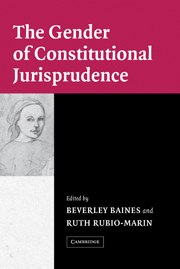Book contents
- Frontmatter
- Contents
- List of Contributors
- Acknowledgments
- The Gender of Constitutional Jurisprudence
- Introduction: Toward a Feminist Constitutional Agenda
- 1 Speaking into a Silence: Embedded Constitutionalism, the Australian Constitution, and the Rights of Women
- 2 Using the Canadian Charter of Rights and Freedoms to Constitute Women
- 3 Emancipatory Equality: Gender Jurisprudence under the Colombian Constitution
- 4 Gender Equality and International Human Rights in Costa Rican Constitutional Jurisprudence
- 5 Constituting Women: The French Ways
- 6 Gender in the German Constitution
- 7 India, Sex Equality, and Constitutional Law
- 8 Constitutional Transformation, Gender Equality, and Religious/National Conflict in Israel: Tentative Progress through the Obstacle Course
- 9 “No Nation Can Be Free When One Half of It Is Enslaved”: Constitutional Equality for Women in South Africa
- 10 Engendering the Constitution: The Spanish Experience
- 11 Gender Equality from a Constitutional Perspective: The Case of Turkey
- 12 Gender and the United States Constitution: Equal Protection, Privacy, and Federalism
- Index
- References
10 - Engendering the Constitution: The Spanish Experience
Published online by Cambridge University Press: 14 January 2010
- Frontmatter
- Contents
- List of Contributors
- Acknowledgments
- The Gender of Constitutional Jurisprudence
- Introduction: Toward a Feminist Constitutional Agenda
- 1 Speaking into a Silence: Embedded Constitutionalism, the Australian Constitution, and the Rights of Women
- 2 Using the Canadian Charter of Rights and Freedoms to Constitute Women
- 3 Emancipatory Equality: Gender Jurisprudence under the Colombian Constitution
- 4 Gender Equality and International Human Rights in Costa Rican Constitutional Jurisprudence
- 5 Constituting Women: The French Ways
- 6 Gender in the German Constitution
- 7 India, Sex Equality, and Constitutional Law
- 8 Constitutional Transformation, Gender Equality, and Religious/National Conflict in Israel: Tentative Progress through the Obstacle Course
- 9 “No Nation Can Be Free When One Half of It Is Enslaved”: Constitutional Equality for Women in South Africa
- 10 Engendering the Constitution: The Spanish Experience
- 11 Gender Equality from a Constitutional Perspective: The Case of Turkey
- 12 Gender and the United States Constitution: Equal Protection, Privacy, and Federalism
- Index
- References
Summary
The current Spanish Constitution was enacted in December 1978, marking Spain's transition to democracy after Franco's death. The Constitution expresses its commitment with a territorially decentralized rule of law-based state inspired in democratic and welfare-state principles and establishes a parliamentary monarchy. It recognizes the separation of powers and a list of fundamental rights, which, according to an explicit interpretive rule (Art. 10.2) are to be read in conformity with the Universal Declaration of Human Rights and other relevant international treaties and agreements that Spain has ratified.
The Constitution also foresees the creation of a new organ, the Constitutional Court, which is the ultimate guardian of the Constitution, and is not conceived as part of the ordinary judiciary. This Court has been functioning since 1981. The twelve justices that comprise it are elected for a nine-year term and are appointed by the different branches of government. Among its main attributes for our purposes are those of exercising judicial review of statutes (the ordinary judiciary is not entitled to review laws) and the protection of constitutional rights through amparo. Individuals can bring an action known as an amparo before the Constitutional Court when public authorities have violated their most fundamental rights and the ordinary judiciary has failed to redress their claims.
In few areas can we observe the transformation that Spain has undergone since 1978 better than in the changes women have experienced under the new constitutional order.
- Type
- Chapter
- Information
- The Gender of Constitutional Jurisprudence , pp. 256 - 277Publisher: Cambridge University PressPrint publication year: 2004



